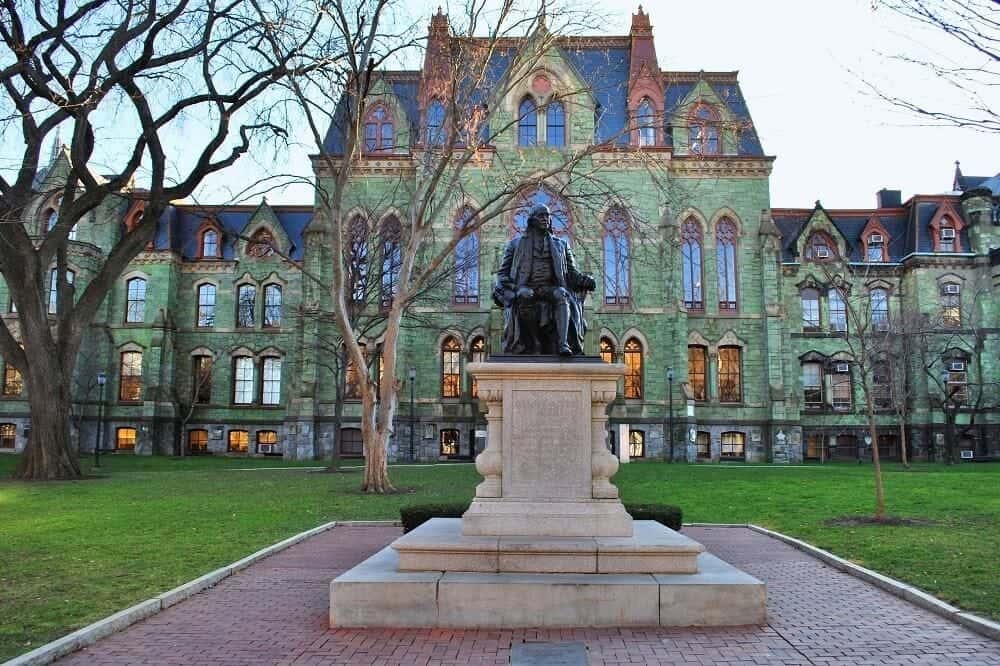
University of Pennsylvania’s Acceptance Rate
The oldest university in the country, the University of Pennsylvania, a private university located in Philadelphia, Pennsylvania, U.S., is one of the eight Ivy League schools and is ranked 7 in the Forbes List-2025. It is widely regarded for its social prestige, high academic standards, and selectivity in admissions. Elon Musk, Warren Buffet, and Donald Trump are some of the notable alumni of this reputed university which was founded in 1740 as a charity school, largely through the efforts of Benjamin Franklin and other leading Philadelphians.
UPenn has 12 schools, four of which offer undergraduate studies: the School of Engineering and Applied Science, the College of Arts & Sciences, the School of Nursing, and the Wharton School. The Wharton School is one of the best business schools in the world.
Changing trends
The University of Pennsylvania is among the most selective universities in the United States UPenn has not released its ED acceptance rates since the Class of 2026, which was 15.63%. It however reported that more than 8,500 students applied to Penn through the Early Decision program in 2023-24 which saw an increase over the last year’s total of over 8,000 applicants. This meant that U Penn witnessed an exceptional Early Decision applicant pool, making it the largest in its history.
In the past three years, the overall acceptance rate for the Class of 2027, 2026, and 2025 has been 4.1%, 4.47%, and 5.7%, compared to acceptance rate of Rice University. Out of a pool of 65,235 applicants in 2023-2024, 3,508 students were admitted, resulting in an acceptance rate of 5.4%. Navigating UPenn Admissions and Acceptance Rates | Ivy Central
The number of applicants for the 2023 application year surpassed the number of applications received by the previous two classes. The Class of 2027 had more than 59,000 applicants and 2,400 students were accepted with an overall acceptance rate of 4.1%. Facts | University of Pennsylvania
Geographical Diversity
The enrolled student population at U Penn for the Class of 2028 has admitted students including students from 109 countries and all 50 states as well as Puerto Rico, U.S. Virgin Islands, Guam, Marshall Islands, and the military APO, according to a Penn Admissions press release. Notably, the Class of 2028 also includes one of the largest cohorts of students from Philadelphia.
Standardized testing
The University of Pennsylvania (UPenn) has been following a test-optional policy, which stays unchanged for the 2024-2025 application cycle. This means that you don’t have to submit SAT or ACT scores if you choose not to. However, if you do have a strong score and it adequately supplements your academic abilities, it could be beneficial to submit it.
To put the testing in context, in recent years the middle 50% of admitted students had SAT scores in the range of 1510 to 1560. Generally speaking, if your scores fall within or above that range, it could boost your application. It is important to remember that standardized test scores are only one part of an application.
Read More: Understanding UC Berkeley’s Acceptance Rate
UPenn evaluates applicants through a holistic process, looking at a variety of factors including academic performance, rigor of high school curriculum, letters of recommendation, demonstrated interest, personal essays, and extracurricular activities. The absence of test scores will not affect your chances negatively. Testing | Penn Admissions
A diverse student body
Equal inclusion of students from different backgrounds is an indication of the college’s ethnic diversity. While Students at Penn are predominantly White with a smaller Asian population, the school has very high racial diversity. 55% percent of students are minorities or people of color (BIPOC). There are 28% more female students than male students enrolled at the University of Pennsylvania with a gender ratio of 56% women to 44% men. Incoming Class Profile | Penn Admissions
Increased competitiveness
Known as the ‘Social Ivy,’ UPenn seeks students who will contribute to its exceptional community, which is essential to its educational mission. Students at UPenn lead active lives outside the classroom, participating in 48 fraternities and sororities that form the hub of the university’s social scene.
Despite this vibrant social life, UPenn’s academics are extremely rigorous. Nearly 30% of Wharton students pursue dual undergraduate degrees from programs like The Huntsman Program, The Jerome Fisher Program, and The Vagelos Program. The applicant pool is exceedingly competitive, demonstrating abilities across various areas, not limited to academics.
The fact that UPenn has a very generous financial aid policy, practices need-blind admissions for students from the U.S., Canada, and Mexico, and meets 100% of a student’s demonstrated need with grants and work-study, which do not require repayment, makes admission even more difficult. Admission for international students is not done on a need-blind basis.
Working with study abroad consultants, overseas education consultants, or, as more commonly known, college counselors, can help you plan and make those high school years count. We can help you with your college application process. Ivy Central offers exceptional focus to help you prepare for college admissions throughout the high school years. Start today!
